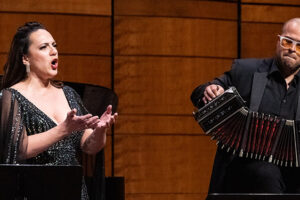

His latest bid for power, Wednesday night at Carnegie Hall, was the title role in Arrigo Boito’s Mefistofele. Mefisto doesn’t so much challenge the authority of “il vecchio,” the ancient of days, as undermine it. He lost the battle to do even that, but if they ever make an opera of The Lord of the Rings, Owens is surely the inevitable choice for Saruman or the Mouth of Sauron.
Boito’s magnificent antihero is a basso profundo who, for once, is an ironist, rather than grounding his character in moral certainty and severity in the manner of Moussorgsky’s Dosifey or Verdi’s Grand Inquisitor or Halévy’s Cardinal de Brogni. One would like to say Owens conquered the role, but his rather grainy voice was neither diabolical nor convincingly seductive nor contemptuous. There were some impressive phrases and a lot of growling but he did not plumb any surfaces: He was a Lucifer without spark.
Boito’s only completed opera is one-of-a-kind, fitting into no previous or subsequent school of opera, especially Italian opera: one of those out-of-left-field masterpieces that contemporaries did not quite know what to make of. Berlioz’ Les Troyens is another such case; one might add Wagner’s post-operatic music-dramas and Moussorgsky’s two grandiose eccentricities.
It is not merely that Boito was trying to master both parts of Goethe’s monumental Faust (as no one else ever did), somehow reducing it to prologue, four acts and epilogue, or the unprecedentedly outsize function of the chorus. Angelic, human, devilish, the chorus is always observing and participating while not usurping center stage, becoming itself the protagonist, as in Verdi’s Nabucco. This, no doubt, is why the Collegiate Chorale chose it for this year’s concert opera at Carnegie Hall. Mefistofele has not been heard in New York for thirteen years and this unusual score is more intriguing the more familiar it becomes, but the chorus’s work, too, left something titanic to be desired. The empyrean was well presented, but the orgies did not make the spine tingle.
There is something quirky about Boito’s style of melody, at least for Italy in 1868. Melodies in this opera are not statements displaying character in the manner of Verdi; they linger in the orchestra and make a subtler impact. Much of the singing is close to speech, but how originally, how fragrantly this speech lies upon flowing melody. In the great duet, “Lontano, lontano,” Faust and Margherita sing phrases of repeated notes that become a thread of regret through the changing instrumental harmonies that surround them.
Much of Mefistofele’s own singing is of a knowing, a double-meaning intent, spoken while winking at us, as if he participates in the story through a frame, not subject to the same rules and concerns as the mortal characters—which, for a demon is perfectly true. Irony is not an easy thing to express in full basso bluster. Boito makes this feel genuine in ways Gounod (or Meyerbeer in Robert le Diable or Berlioz in Damnation de Faust) never attained. Italians, certainly, were not used to such multiple shadings of character: Verdi had never given them ironic characters, and did not do so until Iago, twenty years later—to a libretto by Arrigo Boito. Coincidence?
The part demands a singing actor of the highest, subtlest caliber, though it rewards a thundering bass who can twist words as he fulminates. The New York City Opera scored one of its grandest triumphs with the Tito Capobianco production in 1968: A whole lot of show in a winningly minimal staging. There were projections and such, a swirling Earth, a portable Maypole, a bursting balloon of a globe, a couple of horses. At NYCO, Mefistofele starred the unforgettable Norman Treigle.
His successor, a young debutante named Samuel Ramey, had the finest bass chops of his generation. Decades later, he sang Mefistofele in San Francisco in Robert Carsen’s the-world-as-an-opera-house staging, and at the Met when the latter borrowed the Carsen production. That’s the last New York has heard of it. San Francisco still has the Carsen; it was revived there last month for Ildar Abdrazakov; rumor has it returning to the Met in a couple of years.
I’m grateful to the Collegiate Chorale for bringing this music back to a New York stage, reminding us of how deliciously oddball it is, but their performance did not overwhelm: A chorus in this opera should be more forthright with the demonic despairs. James Bagwell led the American Symphony Orchestra in an unobjectionable reading that brought smiles with its moments of intentional naiveté (the Manhattan Girls Chorus made a charming bunch of cherubs), but left the harpist and the percussionist a bit isolated from the orchestral mixture, their intrusions seeming marginal commentaries to the gospel text.
Arturo Chacón-Cruz, who sang Faust, has an interesting vibrato and clear high notes, but he had to force his light tenor into uncomfortable regions where it turned abrasive. The power-tenor repertory is not for him. He sounded at his best in “Lontano, lontano,” blending well with Julianna Di Giacomo’s Margherita. Di Giacomo caught Margherita’s shyness well, and her romantic alarm as well, but there was no ill-repressed hysteria in her “L’altra notte.”
Mind you, it was a first outing and a tough assignment, which included Elena as well—as is often done, since neither role by itself is a prima donna assignment. Her voice is large and beautiful, and her dramatic instincts were evident in Elena’s aria of the fall of Troy, but she seemed disinclined to sing anything softly. Teresa Buchholz displayed some lovely contralto notes as Pantalis, but she was barely audible as Marta in the quartet. Joseph Michael Brent sang a competent Wagner.
Even in this less than top-notch performance, it was a pleasure to be reminded how unusual and how worthy a score this is.























Comments